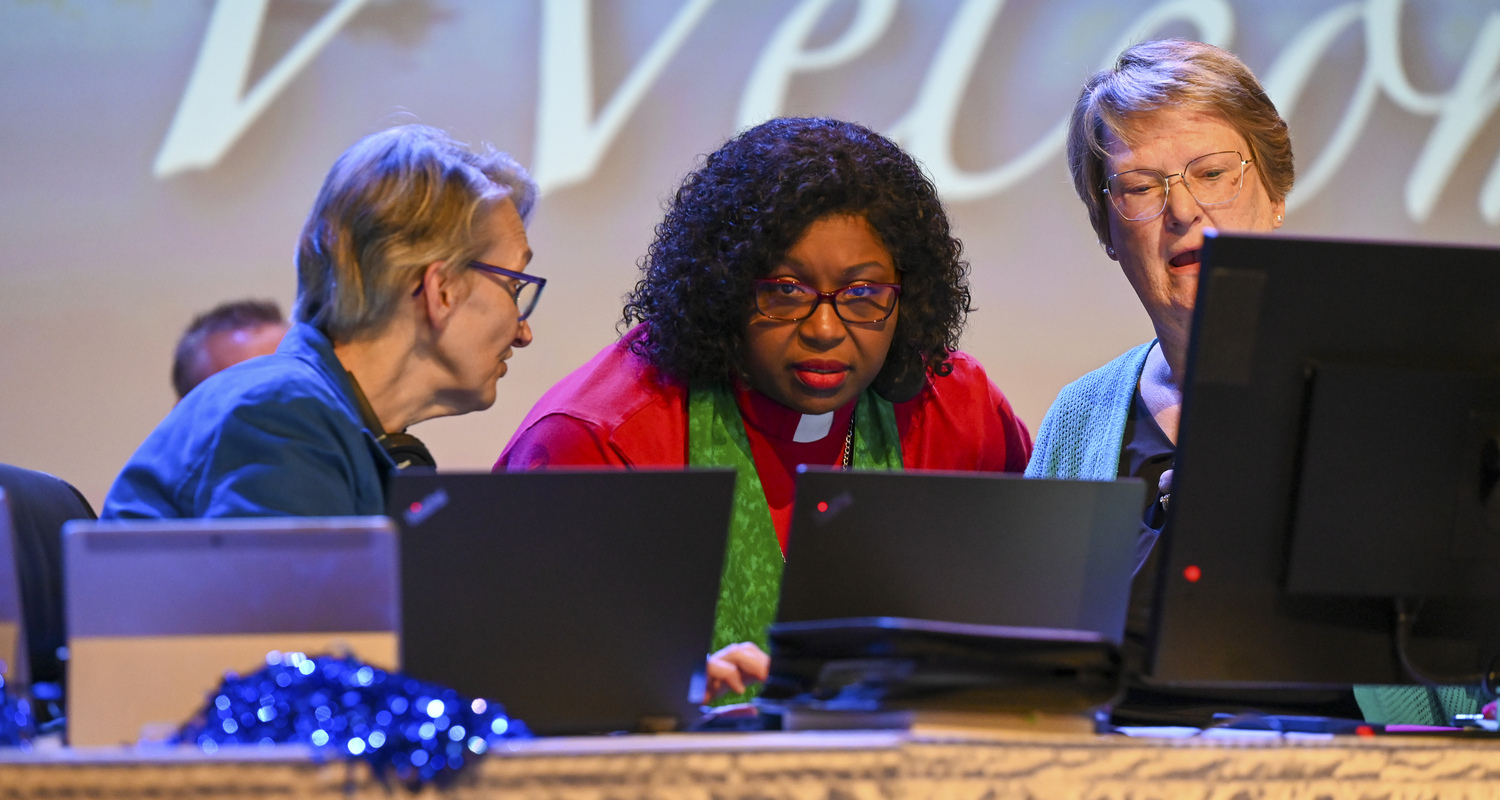.jpg)
The General Assembly was convened in prayer on July 2 for those in the path of Hurricane Beryl, which had increased in strength to a Category 5 storm. Photo by Rich Copley
Halfway through the General Assembly’s strenuous debate on a recommendation from the Committee on Environmental and Climate Justice, Co-Moderator the Rev. CeCe Armstrong paused to convene the body in prayer, having just received word that Hurricane Beryl, then heading through Jamaica and moving through the Caribbean, had just been classified as a Category 5 storm.
“We’re still a praying body called to do the work of the church for the church,” Armstrong said before praying, “and the church is not always inside the building.”
As Teaching Elder William Humphreys of the Presbytery of Santa Fe would later point out during the Assembly’s impassioned consideration of ENV-02 during the seventh plenary this morning, the hurricane and the business were not unrelated.
ENV-02, an overture from the Presbytery of Susquehanna Valley, was intended to lead to “all publicly traded companies whose primary source of income is derived from the exploration, development, and production of fossil fuels” being put on the Presbyterian Church (U.S.A.)’s list of prohibited securities.
Although a related action, ENV-06, was to have been taken up in the morning session, the length of the debate resulted in the suspension of the committee’s report until the afternoon plenary.
Before the body could begin its deliberations on ENV-02, they were alerted to the existence of a Minority Report, which was brought by Teaching Elder Sarah Kneier of the Presbytery of Donegal.
Kneier explained that although the committee’s recommendation demands divestment, it doesn’t provide a process, namely the inclusion of the Committee on Mission Responsibility Through Investment (MRTI).
“Passing 02,” she said, “will result in breaking existing relationships.”

Co-Moderator of the 226th General assembly Cece Armstrong consults parliamentarian Tricia Dykers-Koenig (left) and Stated Clerk of the General Assembly Bronwen Boswell (right) during plenary 7 on July 2, 2024. Photo by Rich Copley
As the Assembly moved through the process of perfecting first the main motion and then the substitute motion, Teaching Elder Dean McDonald of National Capital Presbytery moved to amend the latter.
The amendment, which the Rev. Kerri Allen, chair of MRTI, said would “materially change the minority report and subvert the process that the investing agencies use in order to implement divestment recommendations,” failed by a vote of 178–239.
Humphreys then moved to amend the committee’s original recommendation on behalf of Young Adult Advisory Delegate Andrew Hill, also from the Presbytery of Santa Fe, who, as a YAAD, is unable to make motions.
Hill, a member of the committee, said earlier in the debate that while “MRTI has recognized the urgency, they try to uphold the status quo.”
The amendment called for a change in wording from calling on MRTI to “create a plan for expediting the process” to instead “expeditiously place” “companies whose income is derived from the exploration, development and production of fossil fuels on the PC(USA) list of prohibited securities and to report back on progress to the 227th General Assembly.”
After the amendment passed by a vote of 309–106, perfecting the minority report, debate began on whether the minority report should become the main motion.
Speaking in favor of the minority report as amended, Ruling Elder Mark Eakin of National Capital Presbytery, a retired oceanographer and contributing author to United Nations reports on climate change, said, “Creation is crying out. For anyone here 47 years old or younger, global temperatures have been warmer than average every year of their life. Enough is enough. It’s time for us to divest from fossil fuels now.”
Immediately before debate ended, Ruling Elder Barbara Brown of the Presbytery of Yukon — who earlier said, “If not now, when; if not us, who; I am for divestment” — spoke in favor of the original committee report.
“This is God doing a new thing with us now,” said Brown. “We didn’t follow the process; this is a new process. And MRTI will be involved. The substitute motion is just putting this off for another committee to study. We need to do this, folks.”
By a vote of 168–255, the Assembly voted in favor of the committee’s original report, after which debate continued.
Speaking in favor of ENV-02, Teaching Elder Casey Aldridge of the Presbytery of Charlotte called divestment “a performative act that won’t have an impact on the fossil fuel industry writ large, but it is a tool noted for the moral and economic pressure it is able to apply quickly.”
“I have a lot of respect for MRTI, but as a Ph.D. student studying religious environmental ethics,” he continued, “engagement is too slow, too time intensive and not the right tool.”
The vote to approve was 284–146.
Calling for the order of the day, Armstrong suspended the committee’s report. She then gathered the body again in prayer to honor Teaching Elder Marcy Campbell of the Presbytery of Des Moines, who died before she was able to attend the Assembly.
